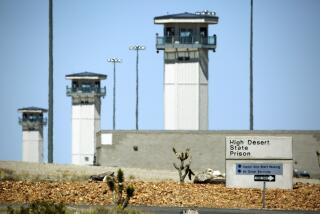Coroners Seminar Isn’t Just a Matter of Life and Death
- Share via
IRVINE — Though the subject was death, reflexive laughter could be heard inside a Radisson Plaza Hotel Orange County Airport meeting room during a slide show of homicide victims presented Monday at a coroners convention here.
“Looks like a shaving accident,” a voice sang out when one grisly image of a dead woman appeared, a knife jutting from her throat.
So began an increasingly popular seminar sponsored by the Orange County coroner’s office, a training session that includes education on defense mechanisms against the psychological and emotional toll of dealing with murder victims.
Said Jim Beisner, Orange County’s chief deputy coroner: “Gallows humor is unavoidable. But most coroners are sensitive enough to keep it to themselves.
“The best therapy for us is still to be compassionate in helping others in their grief,” he said. “When someone dies, people have clear memories of how you notified them, what cologne you were wearing and what color shirt you had on that day.”
For seven years, the two-week-long, biannual series of classes for rookie and veteran coroners has covered subjects ranging from strategies in notifying victims’ relatives to forensic analysis to “coroner ethics.”
Most of this round’s 38 students converged at the Irvine hotel from throughout California as part of mandatory training required every year by the state.
Others flew in from other parts of the western United States to participate in what is recognized as one of the most comprehensive training sessions of its kind in the nation.
Even rookie coroners understand the need to strike a balance between sensitivity and professional composure.
“You need to get over your fear of dead bodies fast,” said Randy Emon, a retired Baldwin Park police sergeant who has been training as a coroner’s investigator in San Bernardino County for five months.
“It’s one thing to see a dead body, and another to cut it open and do an autopsy on it.”
Emon and the others erupted sporadically into morbid banter during discussions over establishing times of death or dealing with decaying corpses.
After a string of tasteless jokes accompanied a slide-show of body parts during the seminar’s “Basic Death Investigation” segment, Emon turned and said: “You ought to hear what some of my co-workers say in private.”
Not all beginning coroners there, however, were preoccupied with how to cope with death. At least one was mulling over life.
In her seventh month of pregnancy with a first child, Heidi Wert, a part-time coroner’s assistant for Orange County, said the training session would help her secure an income respectable enough to begin raising a family.
“I’ve been thinking about life and death a lot lately,” she said. “You have to have a thick skin with both.”
More to Read
Sign up for Essential California
The most important California stories and recommendations in your inbox every morning.
You may occasionally receive promotional content from the Los Angeles Times.













